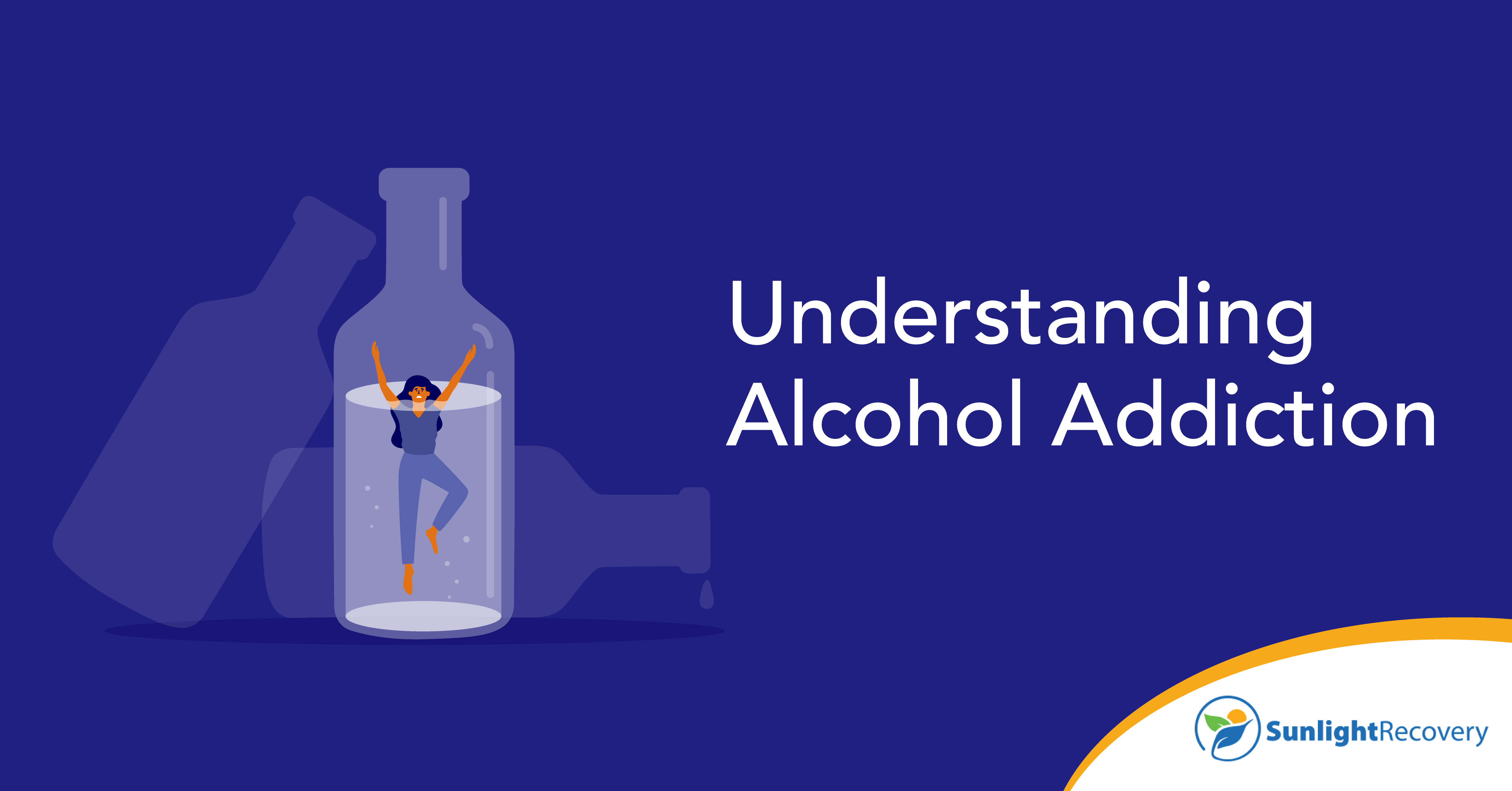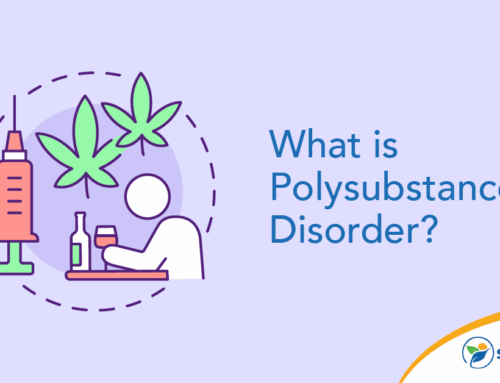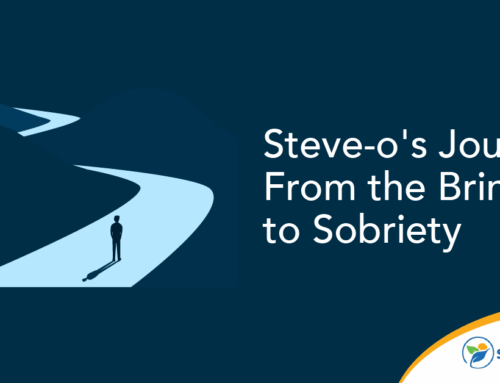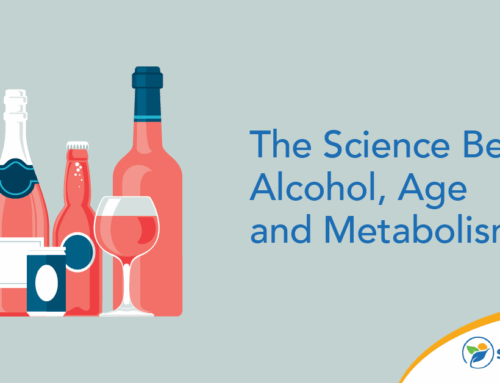Alcohol is legal, normalized and presented as indispensable to celebrations. It can also be habit-forming and eventually lead to the development of an alcohol use disorder (AUD). In the past, this chronic health condition was seen as little more than a moral failing. That’s why understanding alcoholism and its impact on individuals is as important to those seeking help as it is for their loved ones.
What Is Alcohol Addiction?
The Diagnostic and Statistical Manual of Mental Disorders (DSM-5) defines AUD as “a problematic pattern of alcohol use leading to clinically significant impairment or distress.” In other words, people suffering from the condition struggle to control or stop drinking despite its harmful consequences. Like most other substance use disorders, AUD can cause problems in relationships, work and school.
What starts as casual or social drinking can escalate into dependency because of how alcohol interacts with the brain. Drinking affects the brain’s reward system by triggering the release of dopamine, a chemical commonly associated with pleasure. Constant drinking causes the brain to build up tolerance, so the individual must drink more to achieve the same effects.
However, not everyone who drinks develops an addiction. Factors such as genetics, childhood environments and existing mental health conditions contribute to a person’s likelihood of becoming addicted. For example, up to 40% of individuals with depression were also diagnosed with AUD.
Understanding Alcoholism: From Use to Abuse and Dependence
Alcohol addiction is a progressive condition that develops in stages, often subtly. It usually starts with occasional or social use. You may enjoy a couple of glasses when catching up with friends and a drink with your Sunday brunch. Many drinkers remain in this stage for years without any adverse effects on health or relationships.
Abuse occurs when drinking becomes excessive or frequent. People who abuse alcohol may use it to cope with stress, emotions or personal struggles. Binge drinking, defined as having more than four or five drinks in under 2 hours, is also a form of alcohol abuse. Drinking excessively can cause memory lapses, known as blackouts, which can lead to legal problems and poor decision-making. Someone who regularly abuses alcohol may be in denial about how problematic their drinking habits are.
Dependence is the point where the body and mind become reliant on alcohol. Without professional help, quitting at this stage is extremely difficult and potentially dangerous. Those who are dependent experience severe withdrawal symptoms and need to drink large quantities to feel, “normal.” Colloquially, an alcoholic is defined as someone in this stage of the disease.
There’s no set timeline for how individuals progress from use to dependence. Some may stay in the use phase for years, while others quickly advance to abuse or dependence. A family history of alcoholism, regular binge drinking episodes and trauma increase the risk of developing a dependence.
Physical and Psychological Effects of Alcohol Addiction
Alcoholism disease can have a wide range of effects on the body and the mind. Over time, even moderate levels of drinking can cause significant physical health problems. Alcohol puts a strain on your liver, the organ responsible for filtering out toxins. As drinking continues, the liver may become inflamed or scarred, potentially leading to severe conditions like cirrhosis. Excessive alcohol use may contribute to heart disease, high blood pressure and an increased risk of stroke. It can also weaken the immune system.
Alcohol may alter a person’s mood, thinking and even behavior. While some people start drinking to relax or cope with stress, ongoing use worsens anxiety, depression and other mental health issues. Many individuals experience mood swings, irritability, and difficulty concentrating as their drinking escalates.
Physical and psychological consequences tend to reinforce one another. As a person’s health declines, they may feel more stressed or discouraged, causing them to drink more, to their detriment. Those struggling with anxiety or depression might find relief by self-medicating with alcohol. But ultimately, drinking can lead to alcohol addiction and only worsen any problem you may face.
Signs and Symptoms of Alcohol Addiction
Recognizing the signs and symptoms of alcohol addiction can help individuals and their loved ones take meaningful action before the problem gets worse. As drinking habits escalate, warning signs of alcohol use disorder may include:
- Increased tolerance. You may start needing more alcohol to feel the same effects you once achieved with smaller amounts.
- Withdrawal symptoms. This includes feeling shaky, irritable, or anxious when not drinking and experiencing nausea or headaches if you go too long without alcohol. In more severe cases of dependency, withdrawal symptoms can become life-threatening.
- Loss of control. Drinking more than you initially intended or continuing to drink even after deciding to stop or cut back indicates a drinking habit that may be out of control.
- Neglecting responsibilities. Repeatedly letting work duties or family obligations slide because of drinking or nursing a hangover is a sign that alcohol is negatively affecting your life. You might find yourself ignoring bills and choosing to spend on alcohol.
- Hiding habits. This includes drinking secretly, lying about how much you consume or avoiding social situations to keep your alcohol use hidden.
Recovery and Support
Recovery from alcohol addiction involves more than just quitting. It’s about making lasting changes to all aspects of your life. Many individuals benefit from attending residential or outpatient treatment programs, where they work with therapists and learn relapse-prevention strategies.
Evidence-based treatments like cognitive behavioral therapy help individuals identify triggers and develop healthier coping skills. Group therapy sessions and 12-step programs allow for shared experiences and encouragement from people facing similar struggles. In some cases, prescribed medications can ease withdrawal symptoms, reduce cravings, and even help maintain long-term sobriety.
Encouragement from friends and family members is invaluable. Loved ones can offer to understand and celebrate your progress. Many people with a substance use disorder find themselves isolated from their families and communities. Having that support system in recovery can make a massive difference to their recovery journey.
Breaking the Bonds of Alcoholism
When you’re worried about your drinking, understanding alcohol addiction is the first step toward breaking its hold. Now, you need to reach out for the support you deserve. Our dedicated team understands what you’re going through. Get in touch with Sunlight Recovery. We’re available 24 hours a day, 7 days a week, and we’re ready to listen.







